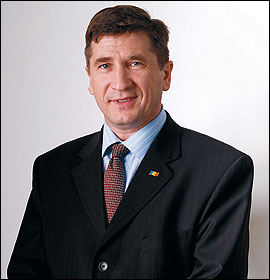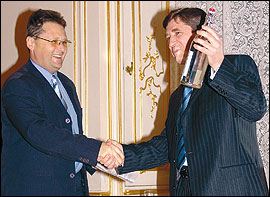 |
Presidency 2006: Moldova, first among equals in the ICPDR familyIn its continuing series, Danube Watch presents portraits of the leaders whose passion and commitment help determine the future of our river basin. In this issue we speak to ICPDR President for 2006 Constantin Mihailescu. |
 |
Constantin Mihailescu, Minister of Environment and Natural Resources and ICPDR President 2006. |
In the presence of diplomatic representation from all Danube Basin countries, István Őri, State Secretary of the Ministry of Environment and Water Management of Hungary, presented a bottle of Danube water to Constantin Mihailescu, Minister of Environment and Natural Resources of Moldova on January 18. With this symbolic gesture, the ICPDR Presidency 2006 passes to Moldova, a small country with large ambitions.
Danube Watch: Moldova holds a small part of the Danube River Basin, but will lead the ICPDR family
in 2006. Is this a challenge for your country?
Mihailescu: Certainly it is a great challenge for my country to chair such an important European commission
as the ICPDR. We have only 1.6% of the Danube Basin but the challenges which we face are the same for the whole Danube community and we will rely on the experience accumulated in the Danube Basin for the last ten to twelve years.
Danube Watch: What are your goals for the presidency?
Mihailescu: First of all we will continue with the activities started by earlier presidencies, especially to continue with the policy started by the European Commission and Hungary regarding the implementation
of the Water Framework Directive (WFD) and the Danube Protection Convention. In this context we will facilitate the elaboration of the Integrated River Basin Management Plans for the tributaries of the Danube. This will strengthen regional cooperation between countries that share the same basins. Moldova will also support the initiation of regional tributary projects aimed at strengthening countries’ capacities to develop and implement the Integrated River Basin Management
Plans, Flood Action Plans and other WFD provisions.
We will be organising the Danube Workshop on implementation
of the WFD in Moldova, and plan to support activities related to technical issues of the WFD such as identification of heavily modified water bodies, reference conditions, typology of water bodies and others.
We will promote sub-basin cooperation involving mainly non-EU member contracting parties and to deepen the cooperation with the Danube Black Sea Commission. The exchange of experience between the ICPDR and other relevant river commissions will also be a priority during the Moldovan presidency, as well as to promote the experience of the ICPDR among other institutions in Europe and worldwide.
 |
Constantin Mihailescu receives a bottle of Danube water representing the ICPDR presidency from Istvan Őri, State Secretary of the Ministry of Environment and Water Management of Hungary on January 18. |
Danube Watch: Your country shares the Prut River Basin with Romania and Ukraine. What steps are being taken to improve international cooperation in this sub-basin?
Mihailescu: First of all we have prepared the so-called ‘Prut Initiative’ and the sense of this initiation is based on achieving the goals of the WFD through the improvement
of international cooperation in the basin. We have a lot of work to do here. The Prut River is the last significant tributary of the Danube and for a long period of time it formed the border between the USSR and Europe. According to practices in environmental management common then, environmental concerns were not the highest priority. Very soon the Prut River
will become the border of the EU and Moldova and Ukraine have individual Action Plans with the EU and actively participate in the Good Neighbourhood Program. These action plans could serve as basic ones for the promotion of cooperation with the EU and also bilateral and trilateral collaboration.
We also want to participate actively in all events where the issues for implementation of the WFD are discussed. That is why one of the priorities of our presidency is designated to non-EU accession countries like Moldova, Ukraine, Bosnia and Herzegovina, and Serbia and Montenegro. We rely very much on the experience of the EU member states in our ambitions to develop national integrated management plans for our parts of the Danube River, which will become a part of the whole Danube Integrated River Basin Management Plan.
Danube Watch: This year your country will be in the spotlight at the celebration of Danube Day on June 29. What special events are planned to bring the Danube Rivers closer to the people?
Mihailescu: I believe we have to extend Danube Day to Danube Week or even more – we should think about the Danube each day. That is why we are planning many activities which cannot be held in one day and we will organise a number of events throughout the whole year. We plan to have a lot of publicity for Danube Day in the Prut River Basin, and to present materials in regional mass-media on the celebration of Danube Day at the basin-wide level.
During the Danube Day celebration week in Moldova we shall organise art and essay contests for children, public actions on greening
of the settlements, river corridors, etc. Through all these and other events I hope that our people will have more information on the Danube and public awareness on the state of the environment will rise.
Danube Watch: Thank you Mr Mihailescu and all the best for your presidency!
| CONSTANTIN MIHAILESCU | ||
|---|---|---|
| Constantin Mihailescu has had a long career of experience working to protect water and the environment. He received his first degree from Tiraspol State University, Republic of Moldova, in Geography and Biology. This was followed up with a PhD in Geography from the Institute of Geography at the Academy of Sciences of the USSR in Moscow and a Doctor Habilitate in Geography from the Institute of Geography of Moldova in Chisinau. For more than 15 years, Constantin Mihailescu has provided expert services in environmental evaluation and assessment for many regional projects and programmes implemented in the Black Sea Region. He is the author of more than 160 scientific publications including eight monographs and one patent. | ||
| Employment and Professional Experience | ||
| 2004–present | Minister of the Environment and Natural Resources of the Republic of Moldova | |
| 2000–2004 | Environmental Officer – Moldova Office, Citizens Network for Foreign Affairs | |
| 1999–2000 | Capacity Building Officer - Moldova Office Regional Environmental Centre (REC) | |
| 1997–1998 | Senior Advisor of the Commission for Science, Culture, Education and Mass Media, Parliament of the Republic of Moldova | |
| 1990–1997 | Head of the Department of Geography and Learned Secretary of the Institute of Geo- graphy, Chairman of the INQUA Moldova Association, Academy of Sciences of the Republic of Moldova | |
| 1986–1990 | Senior Lecturer of the Department of Geo- graphy and Biology, University of Tiraspol | |